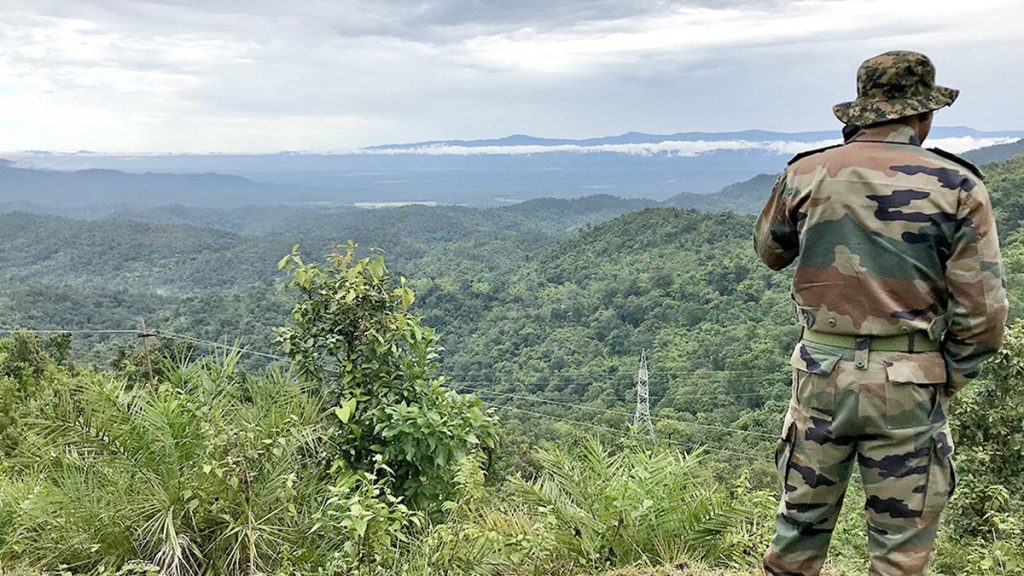Manipur strife pushes 230 lives to dense jungle
Several Meitei families from Manipur’s Moreh, which had fled to Myanmar as the violence broke, seek help for return as their stay there gets extended

An Army man is stationed near the India-Myanmar border in Manipur. Photo: Special Arrangement
August 13, 2023 12:50 am | Updated 08:36 am IST – IMPHAL
In early May, when violence broke out in Moreh, a commercial town bordering Myanmar, beginning a cascading effect that has led to the turmoil in Manipur, 230 Indian nationals from the Meitei ethnic group, went across the border. With little time to think, they believed they had escaped to safety, but have been stranded in the jungle since May 3. Moreh, through which the Asian Highway 1 runs, connecting Tokyo to Turkey, is currently surrounded by the Kuki-Zo tribes. The ethnic conflict has impacted about 60,000 people across the State.
On May 3, Bhojendra was getting ready for a puja around 5 p.m. when he got a call from his relative in Churachandpur, 140 km away. “He said that a fight had broken out, but I didn’t think much of it,” Bhojendra recounts. Then from his window he saw a few people arguing in the market. “I still didn’t think much of it.”
Kukis and Meiteis had always lived in close harmony in Moreh. Plus, the Indian Reserve Battalion (IRB), the police, and the Central Armed Police Forces’ Assam Rifles were deployed. But the crowd grew into a mob.
Around 6 p.m., there was panic in Moreh. It began with stone throwing, and quickly escalated to setting Meitei shops on fire. Finally, homes were burnt. “They burnt Tamil houses too,” adds Laihoba, who escaped with his family of five. State government sources say that about 60 houses and shops have been burnt, of which 45 belong to Tamils. The group settled in Manipur in the 1960s and run businesses here.
Bhojendra says he called the police, but there was no response. “I ran to the Assam Rifles depot next to my house for help,” he recollects, but claims they “stood and watched”.
To save their lives, he and over 200 other Meiteis ran across the border as “Going towards Tengnoupal, a Kuki-dominated district, was unimaginable.”
Thoiba, a 60-year-old grandfather of three children, along with his wife, son, and daughter-in-law, managed to escape, but his 85-year-old mother was left behind. “I have no idea where she is. Some say they killed her, but I don’t know. Can you find out?” he says.
Over a 100 days later, they have been living in an undisclosed location with the support of local people, many of them local businessmen they had traded with at the No. 2 Line market, close to gate no. 2 at the border.
Bhojendra has made a makeshift classroom for young children. He teaches them English while his friend teaches mathematics.
Now, their money and gold has run out. They have rice and dal for only a few days more. “The local people are friendly here, but we are scared of being discovered by non-government forces. What if they come and shoot us?” he says.
The Chief Minister of Manipur, N. Biren Singh says, “I am working with the Indian Army on the matter. We are trying to contact them and bring them back here. It is a sensitive matter, and our sincere efforts are being put to bring them back to safety.”
After several days of coaxing by the Assam Rifles, a few were brought back, but 230 people are still looking for a way back home. “They are afraid that since it is a Kuki-dominated area. They feel they will not be safe if they return. We are trying to assure them we will ensure their safety. But they are finding it difficult to trust the Assam Rifles here,” a defence personnel adds.
“ Will you help us?” Bhojendra asks again.
ABOUT US
Sanaleipak is dedicated to the people of Manipur as a placeholder for valuable information.
